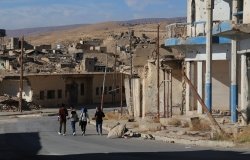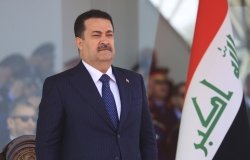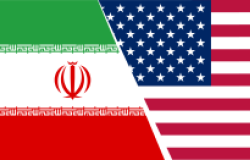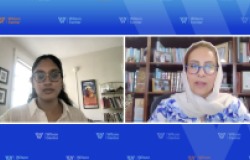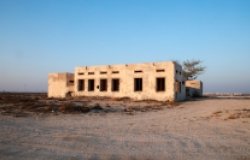How Egypt will shape the new Middle East order
Egypt’s long election season is not just about forming a new government. The real stakes in the 12-week vote for parliament and the two-stage presidential contest are defining a new order—the critical issue across the Middle East for years to come.
David Bagby
June 4, 2012
Egypt’s long election season is not just about forming a new government. The real stakes in the 12-week vote for parliament and the two-stage presidential contest are defining a new order—the critical issue across the Middle East for years to come. The final combination of political forces will influence regional dynamics far beyond Egypt too.
Arabs in 22 countries have always paid attention to what happens politically in Egypt, which accounts for roughly one-quarter of the region’s 350 million people. The core issues in Egypt’s elections—and disputes over who will shape the new order—are already playing out in Tunis and Rabat. They are likely to resurface in Tripoli, Sanaa and even Damascus in the near future.
Since January 2011, Arabs in almost a dozen countries have challenged autocratic rule, some with more success than others. But what they want as an alternative is only beginning to emerge. Islam is clearly a growing political force. Every free election so far has brought more Islamists into office, although no single Islamist party has yet won a parliamentary majority. And many Arabs actually reject the idea of a new order based on either Iran’s Shiite theocracy or Saudi Arabia’s Sunni monarchy.
So the looming issue is the balance among newly elected politicians, secular and Islamist, and how that balance affects writing new constitutions—the frameworks for a new order—and addressing demands from months of unrest.
In Egypt, the final election showdown for president on June 16-17 is particularly stark because it pits the old guard against the rising Islamist trend. Mohammed Morsi is a U.S.-educated Muslim Brotherhood leader. Ahmed Shafiq is a former air force commander who was ousted President Hosni Mubarak’s final prime minister. Egyptians are struggling with the choice between a politically untested Islamist and a holdover from the authoritarian Mubarak regime. The two candidates represent starkly different visions, as outlined below.
The Constitution and Sharia
In the three election campaigns since Mubarak’s ouster, most candidates for parliament and the presidency have supported Article Two, which dates back to 1980 when Anwar Sadat was in power. It states that “the principles of Islamic law are the chief source of legislation.” The difference between secular and Islamist candidates is based largely—and often vaguely—on how that provision would be implemented.
MORSI: The Brotherhood and its political arm, the Freedom and Justice Party, have fluctuated significantly on their vision of Egypt’s new order. Their strategy during the multi-phased parliamentary election launched last year was to convince both Egyptians and the world that they represented a moderate political force.
But during the first round of the presidential election this year, Morsi stridently vowed to implement Sharia law if elected. The former engineer relied heavily on the Muslim Brotherhood reputation and machine to mobilize enough supporters—in a field of 13 candidates—to get to the final run-off between the top two.
Since securing a place in the runoff, however, Morsi has largely avoided the sensitive issue of Islamic law in an attempt to appeal to a wider audience. On May 29, he even said the Freedom and Justice Party had erred when it pushed for 60 Islamists on the 100-member constituent assembly to draft a new constitution—the framework for a new order.
Several political groups had filed complaints that the assembly was unrepresentative of Egypt’s diverse society, which led the Supreme Administrative Court to suspend the assembly in April. “We made a mistake when we tried to put together the constituent assembly, but now we want to do it right and make it inclusive,” Morsi told a press conference.
SHAFIQ: Ahmed Shafiq has avoided directly discussing Sharia. But on June 3, Shafiq charged that Morsi would take orders from religious leadership and take Egypt back to the “dark ages.” “I represent a civil state, the Brotherhood represents a sectarian Brotherhood state. I represent moving forward, they represent going backwards,” Shafiq said in a campaign speech.
Many Egyptians view Shafiq as the secular alternative to a potential Islamist state led by the Brotherhood. His campaign platform instead refers to the military as “the guardian of constitutional legitimacy.”
“We need to deeply and harmoniously focus, in the full sense of the harmonic approach, on the constitution and discuss it and its drafting,” Shafiq said in a statement on May 28. “Any new Egyptian constitution must take the role of the armed forces into account with both meticulousness and balance, especially since it sponsored and supported the 25 January revolution and created the 1952 revolution.”
The Presidency
The central issue is whether Egypt’s new president will have executive powers or be a titular position, with power concentrated instead in parliament and a prime minister. This issue was supposed to be decided by a constitution before the election, but that process was frozen by the court. So neither the candidates nor the public know exactly what they are voting for.
MORSI: “When I am president, the presidency will not be reduced to one person,” Morsi said in a press conference on May 29. “The age of superman has failed and gone,” he added. “The world is no longer like that. I am not like that."
Morsi has portrayed himself as the candidate of the uprising. “The blood from the martyrs’ wounds is still running. I was, still am, and will remain a revolutionary until the revolution’s goals are achieved,” Morsi said at a June 2 press conference.
SHAFIQ: “The presidential battle is almost over and about to reach its final stage,” Shafiq said in a statement on May 28. “This does not take away from the importance of the post or its place in the Egyptian political system that we are rebuilding as [the president] is the head of the executive authority and the mediator between the authorities.”
After Mubarak was sentenced to life in prison on June 2, Shafiq said the future president should “comprehend the historic lesson” of the decision. “This means that nobody in Egypt is still above punishment or accountability.”
Security and Stability
Public security has deteriorated significantly since Mubarak’s ouster in January 2011, leading to growing concern among voters about basic law-and-order issues.
MORSI: At his May 29 press conference, Morsi vowed “the status of policemen and officers will remain untouched” in the future. He also praised the police and the army for securing the presidential elections, which were largely void of the harassment witnessed during votes under Mubarak.
SHAFIQ: Shafiq has played to public fears. “Chaos,” a voice proclaims at the beginning of one of his campaign commercials. Shafiq’s voice then chimes in, “Egypt needs justice and safe citizens.”
During the first round, Shafiq claimed that he could clear Cairo of protesters “in 48 hours” and he would be willing to cut the power to the area around Tahrir Square if necessary. “The state has to be very strong. The strongest thing should be the state,” he said at the American Chamber of Commerce in Cairo on May 14.
Women and Minorities
Two of the most sensitive issues are the status of women and minorities, particularly the 10 percent Christian population. Women were often at the forefront of the uprising, yet many fear their rights and political presence may be diminished in the new order. And both Christians and their churches have faced violent harassment since Mubarak’s ouster.
MORSI: “Our Christian brothers, they are partners in the nation. They will have full rights that are equal to those enjoyed by Muslims,” Morsi told reporters on May 29. “They will be represented as advisers in the presidential institution, and maybe a vice president if possible.”
And in a May 26 television appearance, he said, “Who killed them in protests? Who prevented them from building churches? The old regime, not us.”
On women’s rights, Morsi said “Working women have the right to perform any job they want, whether judge, worker or taxi driver.” “We would never impose a dress code on them. Wearing the veil will remain optional,” he added at the May 29 press conference.
SHAFIQ: Shafiq fiercely campaigned for the Christian vote. “Choose a president of Egypt who will make a country for everyone, and not for one sect,” he said on June 3.
Shafiq had previously voiced his support for a female Christian vice president. But he appeared to backtrack a bit at the American Chamber of Commerce event, when he questioned whether he “could find a Christian lady who’s highly qualified.”
David Bagby is a Master's candidate in Middle East Studies at the American University in Cairo.
http://www.wilsoncenter.org/islamists/how-egypt-will-shape-the-new-middle-east-order
Related Program

Middle East Program
The Wilson Center’s Middle East Program serves as a crucial resource for the policymaking community and beyond, providing analyses and research that helps inform US foreign policymaking, stimulates public debate, and expands knowledge about issues in the wider Middle East and North Africa (MENA) region. Read more




